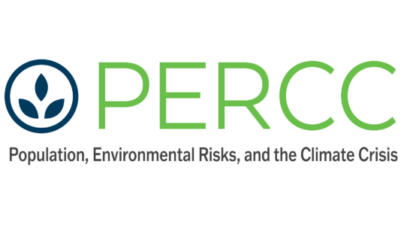
PERCC: Data Across Borders and Disciplines
The climate crisis is accelerating, posing existential threats to people and places around the world. Any successful response must combine mitigation, or reducing carbon emissions, with adaptation, or ways to cope with our new climate-related realities.
Right now, responses of both kinds are slowed, limited, and misallocated due to major gaps in scientific evidence. Programs are not coordinated across sectors; policies do not account for on-the-ground realities; and interventions fail to reach the people who need them the most. The problems are especially acute for adaptation work, where solutions must be nuanced, highly targeted, and demographically refined.
PERCC offers answers. We conduct rigorous, innovative, cross-disciplinary social science research; use it to build publicly accessible datasets, tools, and models; and utilize our findings and insights to help shape climate adaptation policy at every level, from municipalities to national strategies and United Nations agencies. The Council’s approach is underpinned by a climate justice lens, acknowledging that those who contribute the least to climate change are disproportionately harmed.
Adapting to our evolving world requires building new coalitions across sectors, collaborating with local experts and organizations, and finding better ways to share the vital information that empowers effective adaptation response.
PERCC Goals
- Link climate hazards to health outcomes
- Develop programs for girls and young women to thrive in green economies
- Forecast future population dynamics shaped by the climate crisis with a focus on urban settings
How PERCC Works
PERCC drives progress at the intersections of climate, health, gender, and equity by connecting social scientists and public health experts with governments, climate scientists, civil society, and communities on the front lines of the climate crisis. In collaboration with the Council’s network of 14 offices and affiliate organizations and our partners, PERCC has a track record of successfully collaborating with marginalized people in research and building the evidence base to inform effective and cross-cutting programs and policies.
PERCC does groundbreaking research in the social sciences, using methods from machine learning and surveys to qualitative and participatory approaches.
- We make our datasets, models, and tools publicly available online for use by others, including interactive data visualizations.
- We connect and convene experts from around the world, building networks for action and distilling and sharing key findings for diverse audiences.
- We work with policymakers to shape critical climate policies and programs based on nuanced, robust evidence.
- We build capacity and offer training on innovative research at the intersection of climate and population sciences.
Projects and Programs
PERCC conducts research, evaluation, and learning efforts around the world, collaborating with diverse public and private partners to ask and answer critical questions about how, when, and where to act and whom to prioritize in climate adaptation strategies. Our efforts are focused on three main programs.
The Research, Evidence and Analysis on Climate and Health (REACH) Project
- Tracks both direct and indirect links between climate hazards and health outcomes, with a focus on sexual and reproductive health and rights (SRHR), nutrition, and mental health.
- Some of the most immediate risks globally are posed by extreme heat—fully 48% of the world experienced 30+ days of health-threatening extreme heat this summer as a result of climate change.
- In coastal communities, salinity also poses a critical risk: one billion people rely on drinking water endangered by sea level rise and coastal intrusion, the salinization of which is linked to hypertensive disorders that are a leading cause of maternal death.
- Our goal is to scale evidence-based solutions for salinity to three new countries and work with 10 more municipal governments to inform heat action plans that will protect over 7.5 million vulnerable people.
The Girls’ Resilience, Education, Empowerment, and Needs (GREEN) Project
- Right now, 12.5 million girls are unable to attend school for climate-related reasons, and women are 14 times more likely to die in extreme weather events.
- GREEN continues the Council’s history of developing innovative girl-centered programs to improve the health, well-being, and economic power of women and girls. Our work focuses on building mentorship networks, political and educational organizations, and economic alliances.
- Our goal is to pilot curriculums in four more countries, giving girls new green skills in renewable energy, sustainable agriculture, finance, and health.
The Integrated Models of People and Climate Across Time and Space (IMPACTS) Project
- Our work on demographic projections is integrated with climate assessment models to predict future dynamics between climate and people. Those combined Integrated Assessment Models make it possible for stakeholders to target plans for climate response.
- IMPACTS includes open-access tools like the Community Demographic Model (CDM) as well as climate adaptation considerations for specific programs and policies. By pairing our data and models with surveys and qualitative research, PERCC triangulates realities on the ground and tracks large-scale patterns that are otherwise undetectable.
- Our goal is to actively expand IMPACTS to cover 10 new geographies and share our work with diverse stakeholders developing adaptation and mitigation plans.
Centers for Excellence & Scaling Our Impact
To execute our research priorities, PERCC is building Centers for Excellence hubs starting in India, MesoAmerica, and Kenya. The Centers are research institutions working on climate adaptation and demographic modeling, serving as platforms for local and regional partnerships and building cross-country collaborations. The Centers of Excellence also include training programs for the next generation of climate scientists, to build rising research talents in the countries most affected by climate change.
Their output will feed into our broader objective of synthesizing evidence that is urgently needed to power effective government, private sector, and civil society action at the intersection of the climate and social sciences.
Getting Involved
To partner with us on investment, research, outreach and education, fundraising opportunities, or communications can reach us at percc@popcouncil.org.

